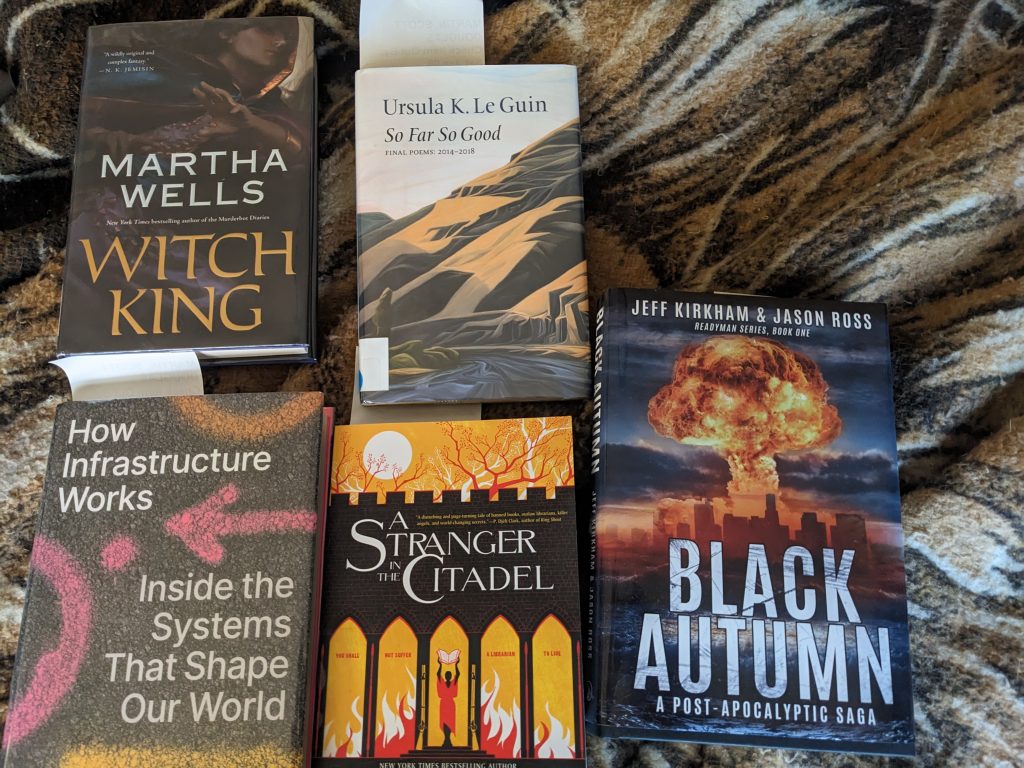Unraveller by Frances Hardinge. A cunningly told story about a strange land, with wild and weird magic, and organic responses to the dangerous and threatening magic. Kellen can unravel curses, while those who curse are feared and often wind up imprisoned for their own good. Friendship and balance wind up being critical – but not as straightforwardly as a “book for young adults” would lead you to expect.
The Way of Kings by Brandon Sanderson. This was a reread, but it’d been long enough that many elements were familiar – but I only really anticipated the broad strokes of each of the three main POV stories. Kaladin’s story forms the backbone, but Shallan and Brightlord Dalinar Kholin have great stories in very different social strata. The minor characters around each (Dalinar’s sons, Shallan and Jasnah, and the members of each of Kaladin’s bands) are all brightly sketched and wonderfully revealed.
Breach of Containment by Elizabeth Bonesteel. The third book in the series; the stakes continue to spiral ever higher. Some new characters advance into focus, and the status quo continues to erode. Elena crosses back from PSI and gets sucked into a deep plot. Greg’s ship and crew change as they’re asked to do more and more, while the universe drifts out of control.
Alone with You in the Ether by Olive Blake. A compelling story of developing friendship, that drifts and grows into romance. A thorough look into two very charming and beyond quirky leads, delving into how people tick, solving abstract problems, math, and art. Fascinating and different.
A City on Mars by Kelly & Zach Weinersmith. This is non-fiction, but with humor and a light touch. It investigates the idea of space settlements, with wide detours into related elements – like antarctic bases, the laws of the deep sea, and the treaties covering outer space. They have a firm viewpoint (mostly that current enthusiasts skip over a lot of missing knowledge and legal constraints), but present all sides without stacking the deck obnoxiously.
Wild Oats & Fireweed by Ursula LeGuin – Poetry, mostly from the 80s. There’s a lot of more pointed commentary on news events, and more emphasis on change rather than acceptance. Still beautiful seeing and describing lands and sometimes the strange customs, or interesting wildlife to match.
Serpent Bride by Sara Douglas – A very interesting book with a few good leads. It’s a rough start, marred by a huge overhead of “what happened last time”. To a degree, it feels like a world in motion – but it also feels like a “related to” sequel. As the book continues, the investment in this set of characters (and reference back to old characters and events) lessens, allowing more space for the well told tale.
Twisted Citadel by Sara Douglas. A very good sequel, with only the least hangover from the previous series. There’s an abrupt change sprung right at the beginning that mostly fell flat (the One for Kanubai)- but once you are past it, the substitution winds up being fine. It just wastes the relationships and enmity that was developed for the whole first book. The end, however, has a very dramatic shakeup — much more than you expect from the average middle of a trilogy.
(I returned The Other Valley by Scott Alexander Howard because it expired after a renewal; I’ll check it out again sometime next year.)
